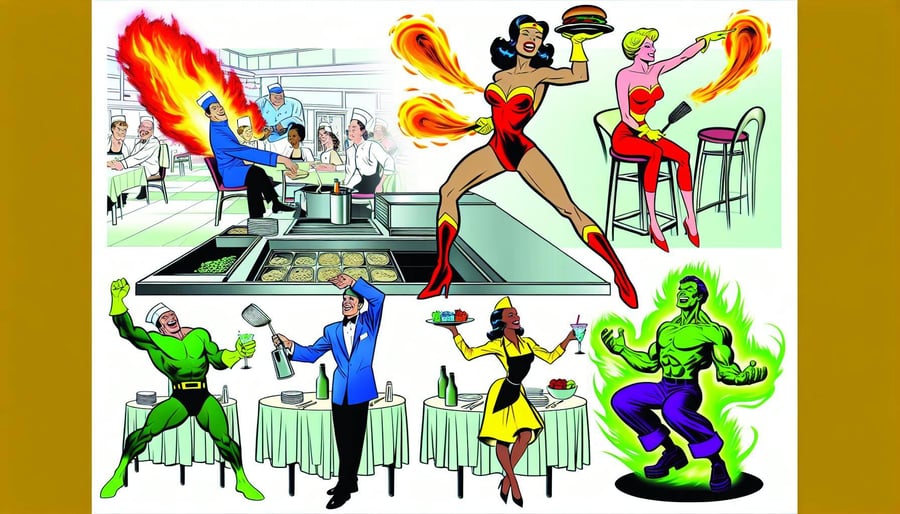Recently, I had the pleasure of sitting down with Justin Ulrich on the Local Marketing Lab podcast, and boy, did we dive deep into the world of restaurant community building.
Now, if you know me, you know I can't resist a good Marvel reference or a chance to geek out about the latest innovations in our industry. But today, I want to share something even more powerful than vibranium – the incredible impact of building a strong community in the restaurant space.
In an industry that's more crowded than ever, standing out isn't just about having the flashiest AI or the sleekest POS system. It's about creating connections, fostering relationships, and yes, sometimes even sharing your massive Marvel collection on a podcast (sorry, not sorry, Justin!).
So, let's dive into some key takeaways from our chat with Justin about community building.
The Power of Community
In our chat, Justin and I explored the pivotal role that community plays in the restaurant landscape. Let's dive deeper into why it matters:
Building Trust and Relationships
One of the key aspects of restaurant community building is establishing trust. During the podcast, I shared my perspective on this:
"We're in the people business. All of us are in the people business. Every one of us. It's so funny how detached companies can get from the one thing that we all operate on, which is people. It's so absolutely important."
Building trust in our community goes beyond just selling products or services. It's about:
-
Understanding the unique challenges faced by restaurant operators
-
Demonstrating a genuine commitment to solving their problems
-
Consistently delivering value, even when it doesn't directly benefit your bottom line
For example, at Popcorn GTM, we often find ourselves connecting our clients with the right people in the industry, even if it doesn't immediately result in a sale for us. This approach builds long-term trust and positions us as a valuable partner rather than just another vendor.

Sharing Knowledge and Best Practices
A strong community fosters an environment where knowledge sharing becomes second nature. This is crucial in the fast-paced restaurant world. Here's why:
- Rapid technological advancements: The restaurant tech landscape is constantly evolving. By fostering a culture of knowledge sharing, we help each other stay ahead of the curve.
- Diverse expertise: Our community includes professionals from various backgrounds - restaurateurs, tech developers, marketers, and more. This diversity of thought leads to innovative solutions.
- Problem-solving: When we share our experiences, both successes and failures, we collectively reduce the learning curve for others in the industry.
One practical way we've seen this in action is through industry-specific podcasts and webinars. These platforms allow experts to share insights that can benefit the entire community, from small independent restaurants to large chains.
Standing Out in a Crowded Market
With the restaurant space becoming increasingly crowded, community building offers a unique way to differentiate your brand. Here's how:
- Establishing thought leadership: By consistently sharing valuable insights and participating in industry discussions, you position your brand as an authority in the field.
- Creating a brand personality: Community engagement allows you to showcase your brand's unique voice and values. For instance, our approach at Popcorn GTM combines professional expertise with a touch of pop culture fun (hence my Marvel references!).
- Building a network of advocates: When you actively contribute to the community, you naturally develop a network of peers who recognize your value. These connections can lead to partnerships, referrals, and other growth opportunities.
- Demonstrating industry commitment: Active community participation shows that you're invested in the industry's overall success, not just your own. This commitment resonates with potential clients and partners.
By focusing on these aspects of community building, restaurant companies can create a strong, recognizable presence in the market that goes beyond just their product offerings.
Examples of Effective Restaurant Community Building
During our conversation, we highlighted several individuals and companies doing an exceptional job at community building:
- Jeremy Julian - CRO at Custom Business Solutions and host of The Restaurant Technology Guys podcast
- Shawn Walchef - CEO of Cali BBQ Media
- Troy Hooper - CEO of Pepper Lunch
These industry leaders have created platforms that not only showcase their expertise but also provide valuable resources to the wider restaurant community. I definitely recommend checking these individuals out!
Leveraging Technology for Community Building
In our conversation, we also touched on how technology itself can be used as a tool for community building. Here's how:
AI-Powered Engagement
One exciting development we discussed is the use of AI in managing customer feedback. For instance, I mentioned a client of ours, Akira, who's doing innovative work in this area:
"What Akira thought around this is that, well, what if I had a thousand locations? Can a human being actually stay on top of all those actual written reviews? Not the pluses or minuses, the actual context."
This AI-driven approach not only helps restaurants manage feedback more effectively but also creates a stronger connection between the brand and its customers. By promptly addressing concerns and identifying trends, restaurants can build trust and loyalty within their community.
Virtual and Augmented Reality
Another area with huge potential for community building is VR and AR technology. Imagine:
- Virtual restaurant tours for potential franchisees
- AR-enhanced menu experiences for customers
- VR training programs for staff across multiple locations
These technologies can create shared experiences that bring the restaurant community closer together, despite physical distances.
Building a strong community in the restaurant space isn't just a nice-to-have – it's becoming essential for success in our increasingly connected world. By focusing on trust, knowledge sharing, and leveraging technology, we can create a thriving ecosystem that benefits everyone from providers to restaurant operators to end customers.
If you found these insights valuable, I highly recommend checking out the full episode of the Local Marketing Lab podcast. Justin and the team at Evocalize are doing great work in bringing together voices from across the industry.
Remember, in the restaurant space, we're all in this together. By building strong communities, we can create a future that's more innovative, efficient, and responsive to the needs of restaurants and their guests. Let's continue to connect, share, and grow as an industry.
And don't forget to subscribe to our podcast!

.png?width=1960&height=1103&name=pocporn%20partnership%20power%20(1).png)



